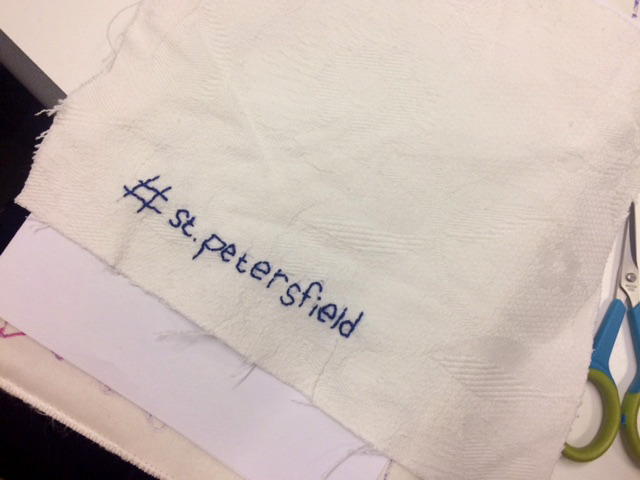
People’s History Museum (PHM) runs a monthly textile workshop, The Fabric of Protest, that brings together conversation and making, politics and craft.
Here artist Helen Mather, who leads the workshops, tells us about what happens in the session and what the participants have been learning and creating so far in 2019.
‘At The Fabric of Protest workshops we take inspiration from the museum’s collection and work collaboratively to produce pieces of artwork rich in personal responses and exploration. Whatever your needlecraft skills happen to be there are activities to enhance and hone skills. Each meet up we work to an agreed theme or further develop ideas from a previous workshop.
We started 2019 remembering the Peterloo Massacre of 1819, where 60,000 people gathered in Manchester to campaign for democracy. They were met with violence from the yeomanry, and what was meant to be a beautiful, peaceful, hopeful day ended in bloodshed and despair.
It’s almost 200 years since the Peterloo Massacre on 16 August 2019 and People’s History Museum is exploring the past, present and future of protest throughout its galleries, exhibitions and events programme with its headline exhibition, Disrupt? Peterloo and Protest opening on Saturday 23 March. The Fabric of Protest group will be working on this theme throughout the year, but with such a big subject, where did we begin?
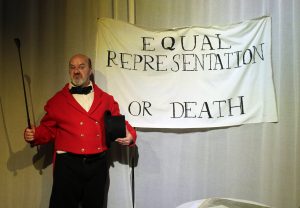 In one of the first sessions of 2019 we started with a fabulous if not heart breaking Living History performance from PHM’s Learning Programme, Peterloo, that took place in the museum galleries. We learnt about the different accounts of Peterloo from witnesses. Did the masses provoke violence? Did the yeomanry plan to charge? Who was to blame?
In one of the first sessions of 2019 we started with a fabulous if not heart breaking Living History performance from PHM’s Learning Programme, Peterloo, that took place in the museum galleries. We learnt about the different accounts of Peterloo from witnesses. Did the masses provoke violence? Did the yeomanry plan to charge? Who was to blame?
Back in the studio we talked about things that resonated with us and the power of inequality. We recalled the Hillsborough disaster, talked about poverty, how that looks today and how it is still punished.
In groups and individually, participants began to make patches of fabric illustrating thoughts and ideas from Peterloo. These patches will be forming a larger textile mind map of our explorations of Peterloo over the next year. We hope people can see this and add to the map throughout the year, so watch this space!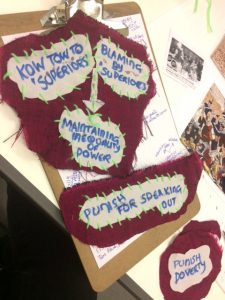
This month, The Fabric of Protest workshop was in the same week as International Women’s Day, so we looked at the involvement of women at Peterloo.
Women were significant at Peterloo in a number of ways. Female Reform Societies were springing up all over the north of England, and in towns around Manchester. Women were organising themselves politically to support the call for suffrage for the men in their lives.
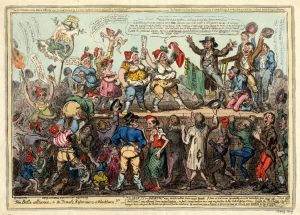 In a meeting of Blackburn female reformers, satirised by British caricaturist George Cruickshank in a print on display at PHM, women presented the men with a handmade liberty cap, a symbol of resistance and a call to action.
In a meeting of Blackburn female reformers, satirised by British caricaturist George Cruickshank in a print on display at PHM, women presented the men with a handmade liberty cap, a symbol of resistance and a call to action.
Women were present in great numbers on the day of the Peterloo Massacre, bringing with them their children, all dressed in their best with many women dressed in white. As the violence broke out, women were disproportionally injured by the cavalry. Margaret Downes, Mary Heyes and Martha Partington are all included in the list of those who lost their lives at Peterloo.
There is a beautiful mural commissioned by PHM, on the exterior canal side wall of the museum, which features a woman and child. Whilst the image stands as a symbol of the women who were present and involved at Peterloo, the woman in the image is the Mancunian daughter of a Windrush victim, an acknowledgement of the injustices still happening today.
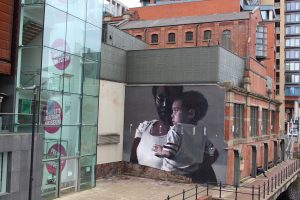 Continuing our work on the mind map collage, we discussed women at the time of Peterloo, focussing on the conditions of these working women at this time. One participant brought in a map of where her ancestor, Martha, had lived her whole life, up and down Barrack Street in Manchester. She talked of the space that Martha occupied; the small and cramped living conditions. Our youngest participant being shocked by the idea of 15 families sharing a toilet.
Continuing our work on the mind map collage, we discussed women at the time of Peterloo, focussing on the conditions of these working women at this time. One participant brought in a map of where her ancestor, Martha, had lived her whole life, up and down Barrack Street in Manchester. She talked of the space that Martha occupied; the small and cramped living conditions. Our youngest participant being shocked by the idea of 15 families sharing a toilet.
The mind map is growing, ideas flowing as the conversations weave in and out of the studio. I love the rumination that happens in between sessions, when we come together and talk about what thoughts have been stirred by the previous month’s session.
And in the words of some of our participants:
‘You don’t need craft skills as you’re provided with help, support and encouragement to help find your own style – you just need enthusiasm and an idea you want to realise!’
‘There is information gathering and sharing, creative activities and putting new skills into practice. I always leave feeling that I have achieved something.’
‘I find the collective interesting and informative, creative and constructive, inspiring and instructive, and above all friendly and fun.’
In the next workshop on Saturday 13 April (1.00pm – 3.30pm) we hope to be able to reach out to more members of the public, to help us grow our mind map further, gathering insights and ideas from people coming to see the Disrupt? Peterloo and Protest exhibition. Come along, learn new techniques and share ideas of protest over a cup of tea.’
Visit PHM’s website to book onto a Fabric of Protest workshop, held monthly on Saturdays. Participants can attend individual workshops or join us on a more regular basis to shape how the work develops.
Keep up to date with The Fabric of protest workshops on this blog written by Helen.
Follow The Fabric of Protest participants on Instagram @fabricofprotest and on Twitter @fabricofprotest.